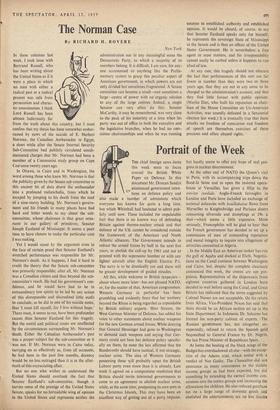The Norman Case
By RICHARD H. ROVERE New York In Ottawa, in Cairo and in Washington, the word among those who knew Mr. Norman is that the publicity given by the Senate sub-committee to this ancient bit of data drove the ambassador into a profound melancholia, from which he escaped by jumping to his death from the roof of a nine-storey building. Mr. Norman's govern- / ment and his friends in many places have had hard and bitter words to say about the sub- committee, whose chairman is that great orna- ment in our gallery of primitives, Senator Joseph Eastland of Mississippi. It seems a poor time to have chosen to make the particular case I was making.
Yet I would stand by the argument even in the face of certain proof that Senator Eastland's wretched performance was responsible for Mr. Norman's death. As it happens, I find it hard to credit the theory that the Senate sub-committee was primarily responsible; after all, Mr. Norman was a Canadian citizen and thus beyond the sub- committee's reach. He had his government's con- fidence, and he would have had to be in extraordinary low spirits to be led by any action of this disreputable and discredited little outfit to conclude, as he did in one of his suicide notes, that 'I must kill myself, for I live without hope.' There must, it seems to me, have been profounder causes than .Senator Eastland for this tragedy. But the moral and political issues are unaffected by the circumstances surrounding Mr. Norman's death. Either the Canadian Ambassador's past was a proper subject for the sub-committee or it was not. If Mr. Norman were in Cairo today, carrying on as effectively as, from all accounts, he had been in the past few months, decency would be no less outraged than it is in the after- math of this excruciating affair.
But no one who wishes to understand the t. United States should overlook the fact that Senator Eastland's sub-committee, though it carries some of the prestige of the United States Senate, speaks for no formidable wing of opinion in the United States and represents neither the administration nor in any meaningful sense the Democratic Party, to which a majority of its members belong. It is difficult, I am sure, for any- one accustomed to anything like the Parlia- mentary system to grasp this peculiar aspect of• American government, in which powers are not ohly divided but sometimes fragmented. A Senate committee can become a small—and sometimes a large—centre of power with no organic relation to any of the large centres. Indeed, a single Senator can very often do this; Senator McCarthy, it may be remembered, was very close to the peak of his notoriety at a time when his party was out of office in both the executive and the legislative branches, when he had no com- mittee chairmanships and when he was running counter to established authority and established opinion. It would be absurd, of course, to say that Senator Eastland speaks only for himself; he represents the sovereign State of Mississippi in the Senate and is thus an officer of the United States Government. He is nevertheless a free agent in most matters, and his irresponsibility cannot easily be curbed unless it happens to run afoul of law.
At any rate, this tragedy should not obscure the fact that performances of this sort are far fewer in number than they were two or three years ago, that they are not in any sense to be charged to the administration's account, and that they find little favour with public opinion. (Martin Dies, who built his reputation as chair- man of the House Committee on Un-American Activities, was soundly defeated in a Senatorial election last week.) It is ironically true that these attacks on freedom of conscience and freedom of speech are themselves exercises of these precious and often abused rights.


































 Previous page
Previous page